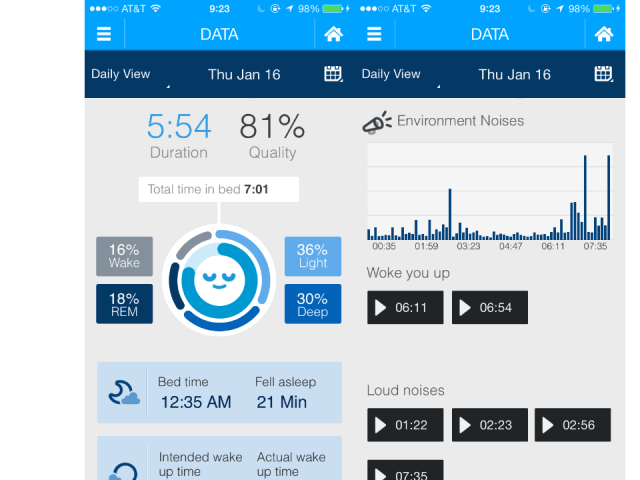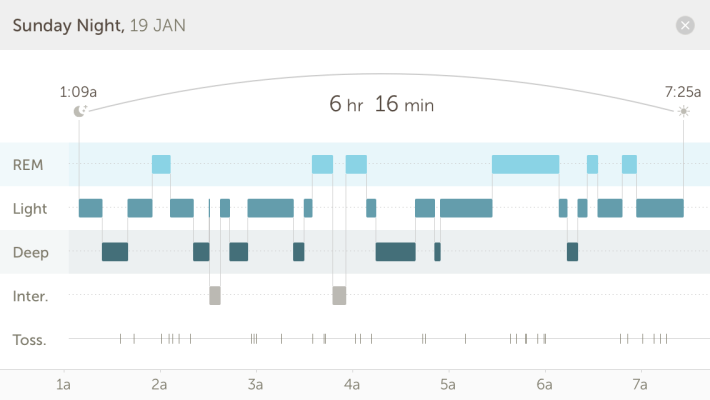One of the most popular wrist health trackers, the Basis B1 smartwatch, has added sleep cycles to variables it automatically tracks. I got my hands on an early beta version (which is now publicly available) and have been comparing it for the last week to other popular sleep trackers on the market. The upshot: of all the consumer-grade sleep trackers, the Basis is easily the most sophisticated. It tracks light, deep, REM, and sleep interruptions, and conveniently displays the totals in a daily dashboard.
Waking up feeling refreshed is one of the best things in life. Quality of sleep may be just as vital to peak cognitive performance as the duration. Relatively uninterrupted sleep with long bouts of rapid-eye movement (REM) may be important in boosting creativity, good memory, and weight loss.
Basis claims its sleep tracking system is be more accurate than the competition, such as the Jawbone Up and Fitbit, because it can track resting heart-rate, which is known to correlate with various sleep states.
“We aren’t making a claim we can replace sleep labs or can be as accurate,” Basis representative Damon Miller said. “But we feel we are in a good proximity for a consumer product.”
So can your heart rate really tell Basis how well you’re sleeping? Yes and no. “Heart rate is not the same as brain waves. And brain waves tell us what stage of sleep we’re in,” said Dr. Lisa Meltzer, a sleep researcher at National Jewish Health hospital in Denver.
That said, compared to the competition, Basis did give me a more nuanced view of my sleep cycle, which could be quite valuable. Last Monday, Jawbone says I got 4:15 of light sleep, compared to 3:08 with Basis. Combined REM and deep was 2:53, compared to 2:05 total deep with Jawbone. Basis claims I woke up two times, with Jawbone claiming I woke up once.
![]()
There are a few important caveats. With the Basis, all of this is automatically recorded. With the Jawbone, I had to manually input my sleep times after the fact, which is just something I could remember to do on a regular basis. I also have to remember when I fell asleep.
On the other hand, I was up for about 20 minutes early on Martin Luther King day, before drifting back to bed for another hour. Basis says this next bout was 100 percent light sleep, while Jawbone says I got another 20 minutes of deep sleep. I could get neither device to recognize my afternoon nap.
Now, it’s hard to know which device is right, and they both could have a slice of the truth. I also tested out a new sleep tracker, Sleeprate, that uses a Polar heart-rate chest strap to measure stages of sleep. Sleeprate claims I was waking up dozens of times per night, especially during my REM cycle.
Sleeprate also records noises throughout the night, and can correlate loud street sounds and snoring with sleep interruptions (note: this was tracked on a different night and the right image is the same app, scrolled down).

Which one of these devices is the most accurate? I don’t know and it may depend on each user. I’m going to go to a sleep lab to see which of these devices is most accurate for my sleep issues.
Each person may have their own idiosyncratic sleep cycle, so if you’re really into the quantified life, or want to diagnose a problem, it’s worth shelling out some money for a diagnosis. The first step in improving sleep could be done with most health trackers or sleep apps: set a consistent bed time and increase the duration of night time rest.
If that doesn’t improve your workday, try tracking deep and REM sleep with the Basis or Sleeprate. Consult a doctor to ensure that your self-experimentation has some basis in medical science.
I’ll report back once I’ve done some more thorough testing. For now, the Basis is my go-to sleep tracker.
